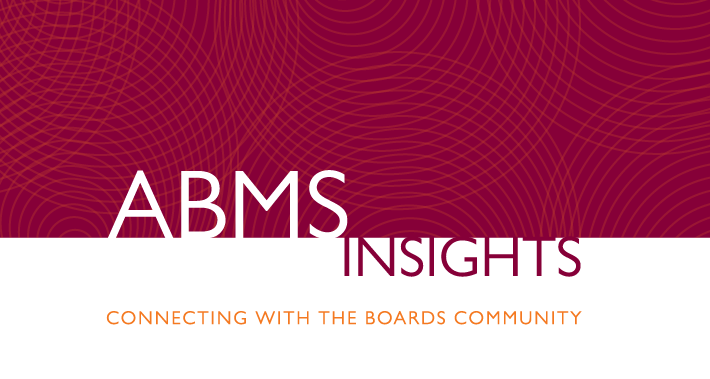
By Mark T. Keegan, MB, MRCPI, MSc, D.ABA, FCCM, Professor of Anesthesiology at Mayo Clinic in Rochester, Minn.

In the midst of the COVID-19 crisis, a renewed appreciation of the roles of health care workers has emerged. The professionalism of those striving to do their best for patients and families under difficult conditions has, with justification, been highlighted and admired.
But the nature and assessment of medical professionalism have been prominent in the American Board of Medical Specialties’ (ABMS’) community discussions even in the heady pre-pandemic days. In the past year, the ABMS Professionalism Task Force, the Symposium on Advancing Assessment of Professionalism in Continuing Certification co-hosted by ABMS and the National Board of Medical Examiners, and the professionalism track at the ABMS Conference 2020 – Virtual have added to the efforts of the decade-old ABMS Ethics and Professionalism Committee (EPCOM). As a member of both the Task Force and EPCOM as well as the moderator at the Symposium, I have been privy to many of those discussions.
Why the focus on professionalism? Multiple reasons. Being a physician implies embracing a set of beliefs, values, and behaviors, and provides an impetus for continued competence, self-improvement, lifelong learning, and introspection. Initial and continuing certification provide a methodology to facilitate these efforts. Physicians’ privileged position in society necessitates meaningful self-regulation and there is a public expectation that licensing and certifying boards ensure that physicians are competent and professional — though the practicalities remain the subject of debate.
These longstanding considerations exist in the context of societal shifts that have resulted in increased scrutiny of resource stewardship and the demand for transparency and accountability. Contemporaneously, physician demographics and characteristics are evolving, the duty of self-care is being acknowledged, and the role of organizational factors that influence an individual’s workplace performance is increasingly being recognized. To add further complexity, events and individuals are subject to the potential incivility of social media.
The need for clear and consistent decisions on professional standing (e.g., licensure) remains essential to protect patient safety and retain public trust in the profession. The great majority of physicians, however, will never come to the attention of a licensing body or ABMS Member Board under inauspicious circumstances. They are professionals who can be trusted to do the right thing even when nobody is looking. Nonetheless, despite routinely delivering high-quality care in respectful and collegial fashion, such physicians — because they are human — may still struggle on occasion with suboptimal interactions or lapses in judgment. Although physicians must be held accountable, unless such lapses are egregious or represent a worrying pattern, there is a desire to support, educate, and remediate rather than penalize or punish them.
Character traits are inherent; behaviors can be learned and modified. Therefore, it is possible to help physicians identify facets of their practice or demeanor that are undesirable and provide them with strategies to decrease the likelihood of unprofessional behavior. More than just behaviors, however, professionalism should be assessed in terms of knowledge, skills, and underlying attitudes that shape behaviors rather than focus exclusively on the behaviors themselves. Formative assessment – assessment for learning — can and should play a role here. The assessment of professionalism is difficult — especially in the real-world, non-training environment – though strategies are discussed in the Symposium proceedings paper.
The concept of professionalism should permeate everything that ABMS and its Member Boards do. Although professionalism may be expressed differently across specialties, there are commonalities in the underlying behaviors, attitudes, and beliefs that promote trustworthiness, elements of which may be assessed longitudinally in a constructive, formative manner. The continuing challenge is to — without burdening us — help board certified physicians live up to our intrinsic desire to do the right thing so that the patients we serve maintain confidence in the medical profession.
“The concept of professionalism should permeate everything that ABMS and its Member Boards do.”
© 2020, American Board of Medical Specialties® (ABMS®)
